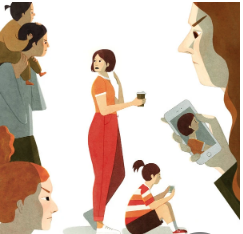Summer break is upon us! All of my teenage clients are officially in countdown mode, some desperately white-knuckling to keep their focus in school and others who have already succumbed to the end of the year summer trance. While this is a time of much anticipated relief and excitement for kids and teens, it is one that is often mixed for parents. There is excitement for more time spent together as a family, the possibility of travel to new places and/or the comforting repetition of summer traditions spent outdoors in the backyard. However, there is also an increase in parental anxiety with summer being a time that begs for freedom, to stay out late with no school-day curfew in sight and to go on spontaneous adventures with friends, the final locations of which couldn’t be named in advance when asking for parental permission. Parents navigate the desire to give their kids independence and freedom while holding back their own fear when they do or their guilt when they don’t. While this article focusses on the mother’s perspective, parental fear and guilt is certainly not gender specific. In my practice I work with kids ages 13 and up, but these articles touch on the importance of freedom and independence beginning in earlier childhood as well.
This article by Kim Brooks, “Motherhood in the Age of Fear,” does a wonderful job illustrating the pain and power of going against the motherhood grain in today’s culture. The article examines the unique cultural context of raising kids today in the United States, and the mass amounts of fear that parents face daily. The article examines the history of how parents became so fearful, how childhood became so sanitized and the costs of the smooth-edged playgrounds of today’s youth on overall development. The author also illuminates the challenges of raising kids in a culture where parents often feel under surveillance by other parents, or even by the law, to parent according to the same fear-based rules and structures. It also beautifully touches on where the rigidly hands-on approaches rooted in hypervigilance can foster legal injustices and fear within lower socio-economic circles, where parental responsibilities may not allow for this mandated ever-watchful eye.
Ultimately, it begs the question, who benefits from this fear-driven approach? It certainly isn’t parents, and if you’re looking for more exploration on the impact on children, I highly suggest the book, “How To Raise An Adult,” which I reviewed in the previous post. Spoiler alert- kids don’t benefit either.
Another New York Times, article that pairs nicely on this theme is, “From Tokyo to Paris, Parents Tell Americans to Chill,” by Lela Moore. It compiles a range of different parenting comments from all over the world that help to illustrate just how culturally unique the fearful American parenting approach truly is and how we may benefit from getting out of our myopic cultural bubble when it comes to the theme of freedom in childhood.
“What really struck me was when I started to notice groups of mothers having coffees together: The Anglophone mothers sat next to each other facing outward, watching their children the whole time. The Swiss mothers sat facing each other around a table having a nice chat, with their backs to the children playing around them.” - Wrike, Switzerland
I can bet that the mothers who were able to turn towards their friends and give full attention to their adult relationships in those few hours then returned to their children substantially more emotionally fueled. Yet, for so many American parents, guilt would prohibit even this slight shift. As a culture, we let the guilt of turning away for a brief moment inhibit the enormous value of what is brought when we then turn back towards our children with a more filled self.
I hope parents read these articles, take a deep breath, and send their kids outside this summer on their own to have a grand adventure, even if it’s just down the block. I hope that when we see parents at the playground reading their books rather than supervising their children’s play, we give them a gentle nod of solidarity and encouragement. I hope parents can begin to challenge their moment to moment guilt for the bigger long-term gains for both their own senses of self and the independence and self-efficacy of their children.
https://www.nytimes.com/2018/07/27/opinion/sunday/motherhood-in-the-age-of-fear.html
